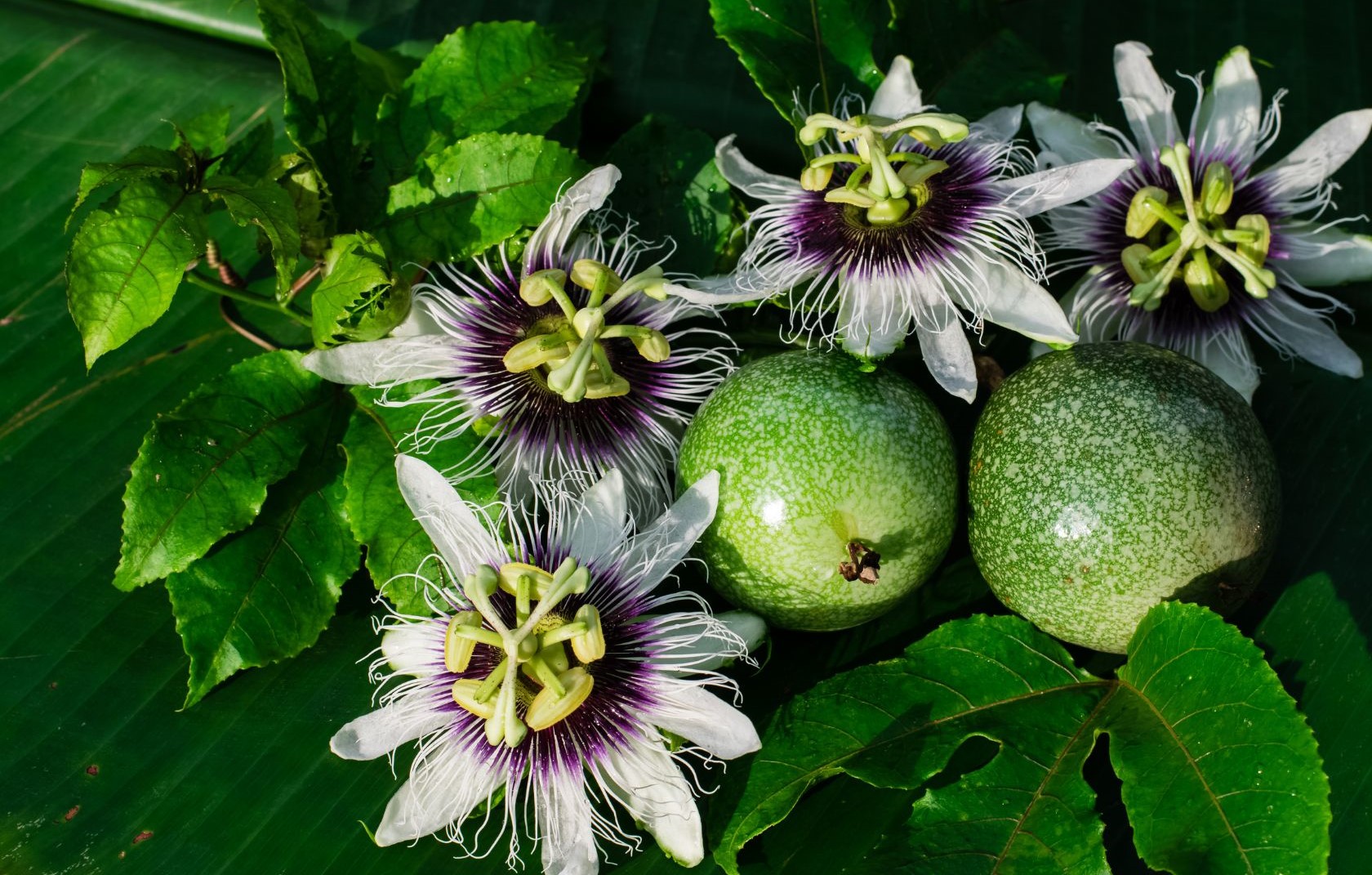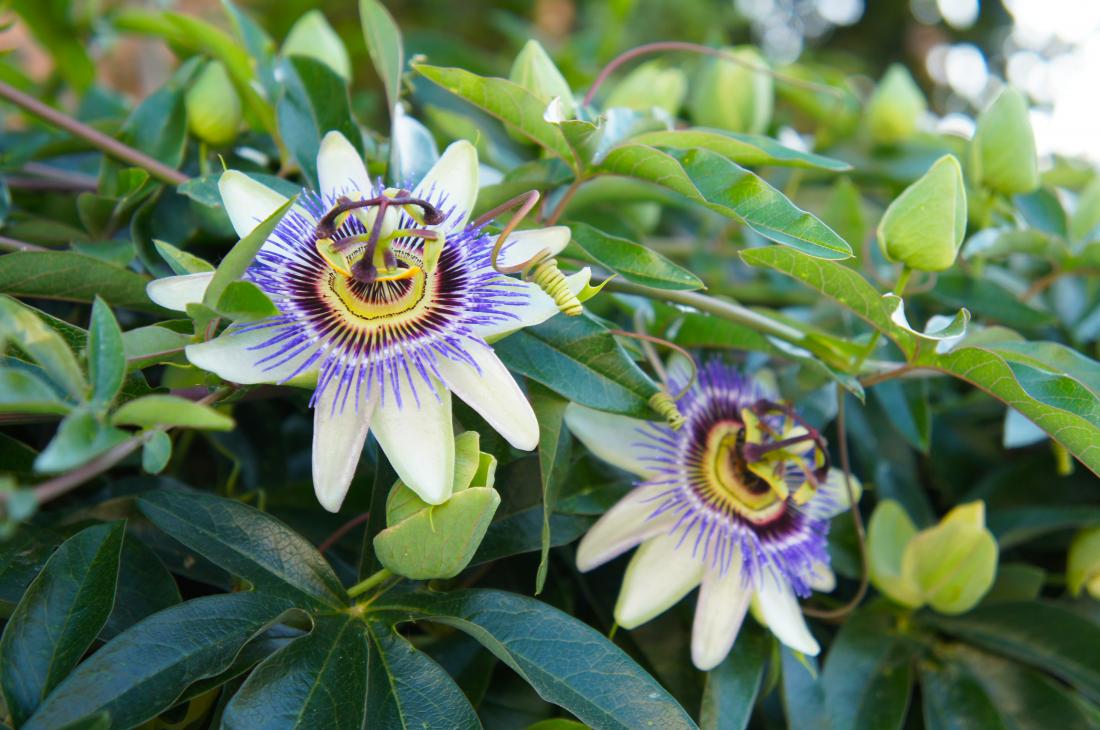Passion Flower: Benefits, Usages, Consumption and Side-effects.
Passion Flower: Benefits, Usages, Consumption and Side-effects.
The passion flower, also known by its scientific name "Passiflora," is a beautiful and unique flowering plant that belongs to the Passifloraceae family. There are over 500 known species of passion flowers, most of which are native to the Americas, especially South America.
Moreover, passion fruit, the fruit produced by some species of passion flowers, is a popular tropical fruit that is both delicious and nutritious. It is rich in vitamins, antioxidants, and dietary fibre. Overall, the passion flower is a fascinating and multifaceted plant with a combination of aesthetic, medicinal, and cultural significance.
Passionflower can be consumed in many ways, including tea, tincture or capsules. The side effects of passionflower are not well known yet. However, it has been noted that it can cause drowsiness and fatigue when taken in excess or too often.
What are the benefits of Passion Flowers?
It's important to note that while passion flower is generally considered safe, it is essential to consult with a healthcare professional before using it as a treatment. Here are some potential benefits of passion flowers:
- Anxiety and Stress Relief: Passionflower has been used as a natural remedy to reduce anxiety and promote relaxation. Studies suggest that it may have calming effects, potentially due to the presence of compounds like flavonoids and alkaloids that interact with the brain's receptors to produce a calming effect.
- Sleep Aid: Passion flower has mild sedative properties, making it a popular natural remedy for insomnia and sleep disturbances. It may help improve sleep quality and promote a restful night's sleep.
- Antioxidant Properties: The plant contains various antioxidants, including flavonoids and phenols, which help neutralize harmful free radicals in the body. These antioxidants may play a role in reducing oxidative stress and supporting overall health.
- Anti-Inflammatory Effects: Some studies suggest that passion flowers may have anti-inflammatory properties, which could be beneficial for managing inflammatory conditions and reducing inflammation-related symptoms.
- Pain Management: Traditional use of passion flower includes using it as a natural pain reliever. While more research is needed, some studies indicate that passion flower extract might have analgesic effects.
- Menopause Symptom Relief: Passion flower may offer relief from certain menopause symptoms, such as hot flashes and mood swings, possibly due to its calming and hormone-balancing effects.
- Gastrointestinal Comfort: Some traditional practices involve using passion flowers to alleviate gastrointestinal discomfort, such as stomach cramps and indigestion.
It's essential to keep in mind that while passion flower may offer these potential benefits, individual responses can vary, and more research is needed to fully understand its mechanisms and efficacy.
How Passion Flower can help to Sleep?
Passionflower (Passiflora) has been traditionally used as a natural remedy to promote relaxation and improve sleep quality. Its potential sleep-inducing effects are believed to be attributed to several mechanisms:
- Anxiolytic (Anti-Anxiety) Effects: Passionflower contains compounds with anxiolytic properties, which can help reduce anxiety and stress levels. Anxiety is a common factor that can disrupt sleep, and by calming the mind and reducing anxious thoughts, passionflower may help individuals fall asleep more easily.
- Sedative Properties: Passionflower has mild sedative properties, which can induce a feeling of drowsiness and relaxation. It contains flavonoids and alkaloids that interact with the brain's receptors, such as gamma-aminobutyric acid (GABA) receptors, which are involved in calming the central nervous system. By enhancing GABA activity, passionflower can have a tranquillizing effect, aiding in sleep initiation.
- Sleep-Wake Cycle Regulation: Some studies suggest that passionflower may help regulate the sleep-wake cycle by influencing the release of certain neurotransmitters and hormones that are involved in sleep regulation, such as serotonin and melatonin. By promoting a more balanced sleep-wake rhythm, passionflower may improve overall sleep quality.
- Pain and Muscle Relaxation: Pain and muscle tension can interfere with falling asleep and staying asleep. Passionflower's analgesic properties might help reduce discomfort, allowing individuals to relax more easily and improve their chances of falling asleep peacefully.
If you are considering using passionflower to improve your sleep, it's best to consult with a healthcare professional, especially if you have existing medical conditions, are taking medications, or are pregnant or breastfeeding. They can provide personalized guidance and ensure that Passionflower is safe and appropriate for your specific situation. Furthermore, using passionflower in combination with other healthy sleep practices, such as maintaining a consistent sleep schedule, creating a relaxing bedtime routine, and creating a sleep-conducive environment, can help maximize its potential benefits for sleep.
How can you Consume Passion Flowers?
- Herbal Tea: Passionflower tea is a popular and simple way to consume the herb. You can find ready-made passionflower tea bags in health food stores or online. Alternatively, you can make your own passionflower tea by steeping dried passionflower leaves or tea bags in hot water for about 10 minutes. You may add honey or a natural sweetener to improve the taste, as passionflower tea can have a somewhat earthy or bitter flavour.
- Tincture: Passionflower tinctures are concentrated liquid extracts of the herb. They are usually alcohol-based and come with a dropper for easy dosing. You can add the recommended number of drops to water, juice, or herbal tea before consuming.
- Capsules or Tablets: Passionflower is available in supplement form as capsules or tablets. This is a convenient option for those who prefer a standardized dosage. Follow the recommended dosage instructions on the product label.
- Powder: Some health food stores or online retailers offer passionflower powder, which can be added to smoothies, juices, or other beverages for consumption.
- Herbal Extracts: Liquid herbal extracts of passionflower can be added to water or other beverages for easy consumption.
- Fresh Passionflower: In areas where passionflowers grow, it's possible to consume them fresh. However, please be cautious as not all passionflower species are safe for consumption, and some may be toxic. If you are still determining the specific type of passionflower growing in your area, it's best to stick to commercially available products.
What can you Cook with Passion Flowers?
Passion flowers (Passiflora) are primarily grown for their ornamental beauty and the fruit they produce, called passion fruit. While the flowers themselves are not typically used in cooking, passion fruit is a delicious and versatile ingredient that can be used in various culinary creations. Here are some ideas for dishes you can cook using passion fruit:
- Fresh Fruit Salad: Add passion fruit pulp to a fresh fruit salad for a burst of tropical flavour and a touch of tanginess.
- Passion Fruit Sauce: Make a sweet and tangy sauce by mixing passion fruit pulp with a bit of sugar or honey. This sauce can be drizzled over pancakes, waffles, ice cream, or yoghurt.
- Passion Fruit Smoothie: Blend passion fruit pulp with yoghurt, milk (or plant-based milk), and other fruits to create a refreshing and tropical smoothie.
- Passion Fruit Sorbet: Use passion fruit juice or pulp as the base for a delightful and refreshing sorbet. You can sweeten it with a bit of sugar or honey and freeze it until firm.
- Passion Fruit Popsicles: Combine passion fruit pulp with fruit juices or purees of your choice to make delicious homemade popsicles.
- Passion Fruit Desserts: Incorporate passion fruit into various desserts like cakes, tarts, puddings, or mousse for a unique and flavorful twist.
- Passion Fruit Salad Dressing: Mix passion fruit juice with olive oil, honey, vinegar, and seasonings to create a tangy and fruity salad dressing.
- Glazes and Sauces: Use passion fruit juice or pulp to make glazes or sauces for meat, fish, or poultry dishes. It adds a delightful sweet and sour note to savoury dishes.
- Marinades: Include passion fruit juice in marinades for meats or tofu to add a tropical touch to your grilled or baked dishes.
- Cocktails and Mocktails: Use passion fruit pulp or juice as a base for tropical cocktails or mocktails. It pairs well with various spirits and adds a vibrant flavour to drinks.
When selecting passion fruit, choose those with wrinkled or dimpled skin, as they are usually ripe and have the best flavour. To extract the pulp, cut the fruit in half and scoop out the seeds and pulp using a spoon. The seeds are edible and add a pleasant crunch to the dishes. Remember to adjust the sweetness according to your preference and the ripeness of the fruit. Passion fruit's unique sweet-tart flavour can elevate a wide range of dishes, adding a taste of the tropics to your culinary creations.
What are the Side Effects of Passion Flower?
Passionflower (Passiflora) is generally considered safe for most people when recommended. However, like any herbal remedy, it can potentially cause side effects or interact with certain medications. Here are some possible side effects and considerations when using passionflower:
- Drowsiness: Passionflower has mild sedative properties, which may cause drowsiness in some individuals. If you are taking medications that also induce drowsiness, combining them with passionflower could increase this effect.
- Dizziness: Some people may experience dizziness or lightheadedness after consuming passionflower, especially if taken in high doses.
- Nausea and Upset Stomach: In rare cases, passionflower may cause stomach discomfort or nausea.
- Allergic Reactions: Allergic reactions to passionflower are uncommon but possible. If you experience any signs of an allergic reaction, such as itching, rash, swelling, or difficulty breathing, discontinue use and seek medical attention immediately.
- Interactions with Medications: Passionflower may interact with certain medications, including sedatives, anti-anxiety drugs, blood thinners, and anticoagulants. It's essential to consult with a healthcare professional if you are taking any medications before using passionflower as a supplement.
- Pregnancy and Breastfeeding: There is limited research on the safety of passionflower during pregnancy and breastfeeding. To be cautious, it's best to avoid using passionflower if you are pregnant or breastfeeding unless recommended by a healthcare professional.
- Central Nervous System Depression: Passionflower's sedative effects may enhance the effects of central nervous system depressants, such as alcohol or benzodiazepines. Avoid consuming passionflower if you are drinking alcohol or taking medications that have a sedative effect.
- Low Blood Pressure: Passionflower has been reported to lower blood pressure in some individuals. If you already have low blood pressure or are taking medications for hypertension, consult with your healthcare provider before using Passion Flower.
As with any herbal supplement, it's crucial to follow the recommended dosages provided on the product label or as advised by a healthcare professional. If you experience any concerning side effects or have any doubts about using Passionflower, consult with a healthcare provider for personalized guidance.
If you have pre-existing medical conditions, are taking medications, or are pregnant or breastfeeding, it's especially important to seek professional advice before using passionflower or any herbal remedy to ensure its safety and appropriateness for your specific situation.
Websites to buy Passion flower tablets:
- https://www.amazon.in/Puritans-Pride-Passion-Flower-Capsules/dp/B00CM6VAOA
- https://www.amazon.in/Trexgenics%C2%AE-PASSION-Flavonoids-Isovitexin-Calmness/dp/B08DLYW22S/ref=sr_1_5?keywords=passion+flower&qid=1696055778&sr=8-5
- https://www.amazon.in/Now-Foods-Passion-Flower-Extract/dp/B002J0KCQ6/ref=sr_1_6?keywords=passion+flower&qid=1696055778&sr=8-6
- https://www.amazon.in/PASSION-FLOWER-EXTRACT-CAPSULES-BOTTLE/dp/B07R52BYGW/ref=sr_1_18?keywords=passion+flower&qid=1696055778&sr=8-18
References:
https://www.britannica.com/plant/passion-flower
https://www.medicalnewstoday.com/articles/323795#takeaway
https://www.healthline.com/health/food-nutrition/benefits-vitamin-d#vitamin-d-deficiency
https://www.medicalnewstoday.com/articles/8947
https://herbalessences.com/en-us/our-ingredients/passion-flowers/
https://en.wikipedia.org/wiki/Passiflora





:max_bytes(150000):strip_icc()/how-is-passion-flower-used-to-treat-anxiety-3024970_final-f2af296341b6457bbd4a30205973f760.png)

Comments
Post a Comment